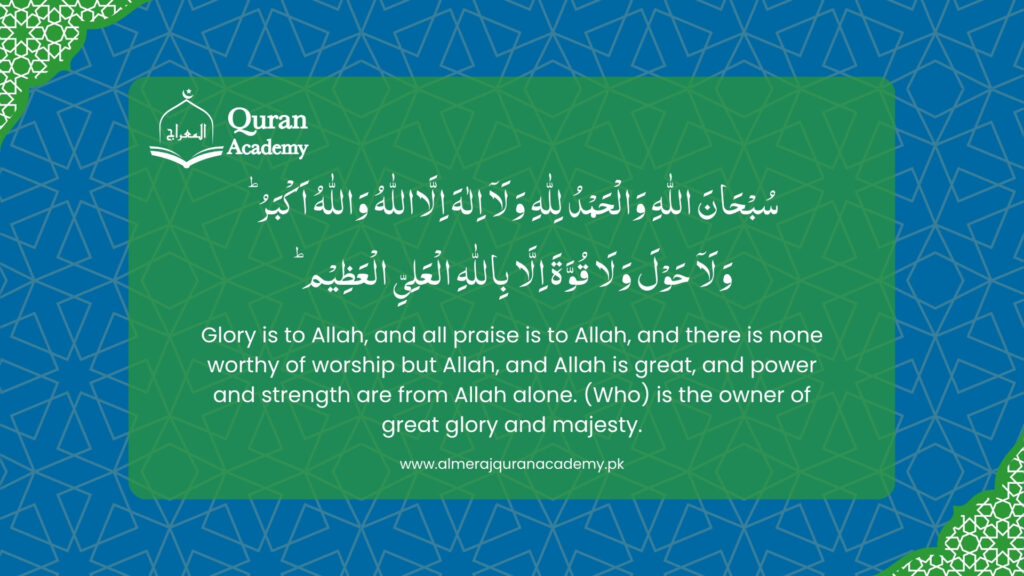Third Kalma
Kalima Tamjeed
The Third Kalima, known as Kalima Tamjeed (كَلِمَاتْ اَلتَّمْجِيدْ), is one of the six fundamental Islamic Kalimas. The Arabic word Tamjeed means “Glorification” or “Praise,” specifically of Allah سُبْحَانَهُ وَتَعَالَى. This Kalima is a declaration of Allah’s Glory, Majesty, and Supremacy. It acknowledges that Allah alone is worthy of all praise and He holds the greatest authority in the universe.
After the 1st Kalima (Tayyibah) which declares faith, and the 2nd Kalima (Shahadat) which is a testimony of faith, the 3rd Kalima is a beautiful way to glorify Allah and strengthen one’s belief through remembrance (Dhikr).
Tamjeed (Word of Majesty)
Subhanallahi walhamdulillahi wala ilaha illallahu wallahu akbar wala hawla wala quwwata illa billahi I-aliyyil I-azeem
“Glory be to Allah, and all praise is for Allah. And there is none worthy of worship except Allah. And Allah is the Greatest. There is no power and no strength except with Allah, the Most High, the Most Great.”
سُبْحَانَ اللّٰهِ وَالْحَمْدُ لِلّٰهِ وَلَآ اِلٰهَ اِلَّااللّٰهُ وَاللّٰهُ اَكْبَرُ ؕ وَلَآ حَوْلَ وَلَا قُوَّةَ اِلَّا بِاللّٰهِ الْعَلِىِّ الْعَظِيْم

The Significance of Kalima Tamjeed – Third Kalima
The Kalima Tamjeed highlights the Power, Majesty, and Greatness of Allah. Words like “SubhanAllah”, “Alhamdulillah”, and “Allahu Akbar” are included in this Kalima, which are known to be among the most beloved words to Allah. The Kalima teaches Muslims to always:
Praise Allah in all circumstances
Recognize His greatness over all matters
Acknowledge His control over strength and power
It also reinforces Tawheed (Oneness of Allah) and helps Muslims stay mindful of Allah’s constant presence and authority.
Kalima Tamjeed – Core Beliefs (Divided into 3 Main Parts):
- Allah is Pure and Free from All Imperfections سُبْحَانَ اللّٰه – Allah is absolutely free from any flaws, weaknesses, or shortcomings.
- All Praise and Worship Belongs to Allah Alone وَالْحَمْدُ لِلّٰه، وَلَآ إِلٰهَ إِلَّا اللّٰهُ – Every kind of praise is only for Allah. No one else is worthy of worship besides Him.
- Allah is the Greatest, and All Power Belongs to Him وَٱللّٰهُ أَكْبَرُ، وَلَا حَوْلَ وَلَا قُوَّةَ إِلَّا بِاللّٰهِ – Allah is the Greatest. No one has power or strength except through Allah.
Reciting Kalima Shahadat – When & Where?
You can recite the 3rd Kalima at any time – morning, evening, during prayers, after salah, or in daily routines. There’s no restriction on timing or frequency.
Suggested Practices:
Add it to your daily Dhikr routine
Teach children the Kalima for early spiritual growth
Recite it after every salah for increased blessings
Reflect on its meaning while reciting to boost your connection with Allah
How Often Should We Recite Kalima Tamjeed?
There is no fixed number. You can:
Recite it a few times daily, or
Recite it hundreds of times during your regular activities — while working, driving, or even resting.
Living the Message of Kalima Tamjeed
While reciting this Kalima brings immense reward, its true essence lies in understanding and embodying its meaning. This Kalima teaches us to:
Glorify Allah سُبْحَانَهُ وَتَعَالَى in every aspect of life
Remain grateful and always praise Him in good and difficult times
Recognize that all power, strength, and greatness belong to Allah alone
When we live by the spirit of this Kalima, our hearts become more connected to Allah, and our actions reflect true humility and submission.
Benefits of the Kalima Tamjeed Based on the Quran and Hadith
The importance of Kalima Tamjeed is evident from various Hadith and verses of the Qur’an. It holds immense value for strengthening one’s faith and belief. Reciting this Kalima not only increases a believer’s connection with Allah سُبْحَانَهُ وَتَعَالَى but also brings countless rewards.
Prophet Muhammad ﷺ used to remember Allah سُبْحَانَهُ وَتَعَالَى, by praising His Greatness
Translation:
The Apostle of Allaah (sal Allaahu alayhi wa sallam) used to remember Allaah, the Great and Majestic, at all moments.
[Sunan Abu Daud 18]
Translation – Abu Hurairah (May Allah be pleased with him) reported:
The Messenger of Allah (ﷺ) said, “Allah the Exalted says: ‘I am as my slave expects me to be, and I am with him when he remembers Me. If he remembers Me inwardly, I will remember him inwardly, and if he remembers Me in an assembly, I will remember him in a better assembly (i.e., in the assembly of angels).”
This Kalima reminds us that a true believer should constantly remember and glorify Allah سُبْحَانَهُ وَتَعَالَى. In doing so, one hopes to receive His mercy, guidance, and blessings.
The importance of remembering Allah is clearly mentioned in the Qur’an.
In Surah Al-Baqarah (2:152), Allah says:
“So remember Me; I will remember you. And be grateful to Me and do not deny Me.”
This verse emphasizes that the more we engage in Dhikr (remembrance), like reciting Kalima Tamjeed, the more Allah سُبْحَانَهُ وَتَعَالَى turns His attention towards us with kindness and reward.
The spiritual benefits of remembering and praising the greatness and exaltedness of Allah سُبْحَانَهُ وَتَعَالَى are clearly evident from the Qur’anic verse and Hadith mentioned above. While reciting the Qur’an itself brings immense blessings, doing so with the Niyyah (intention) of remembering Allah elevates its impact even further.
The value of Dhikr (remembrance) is beautifully described in a Hadith
Translation – Narrated Muhammad bin Ka’b Al-Qurazi: “I heard ‘Abdullah bin Mas’ud saying: ‘The Messenger of Allah (ﷺ) said:
“[Whoever recites a letter] from Allah’s Book, then he receives the reward from it, and the reward of ten the like of it. I do not say that Alif Lam Mim is a letter, but Alif is a letter, Lam is a letter and Mim is a letter.”
[At-Tirmidhi 2910]
This Hadith highlights that every single letter carries reward, and when combined with praise (Tamjeed), the benefits multiply even more.So keep reciting Kalima Tamjeed regularly to draw yourself closer to Allah and earn countless rewards from Him.

